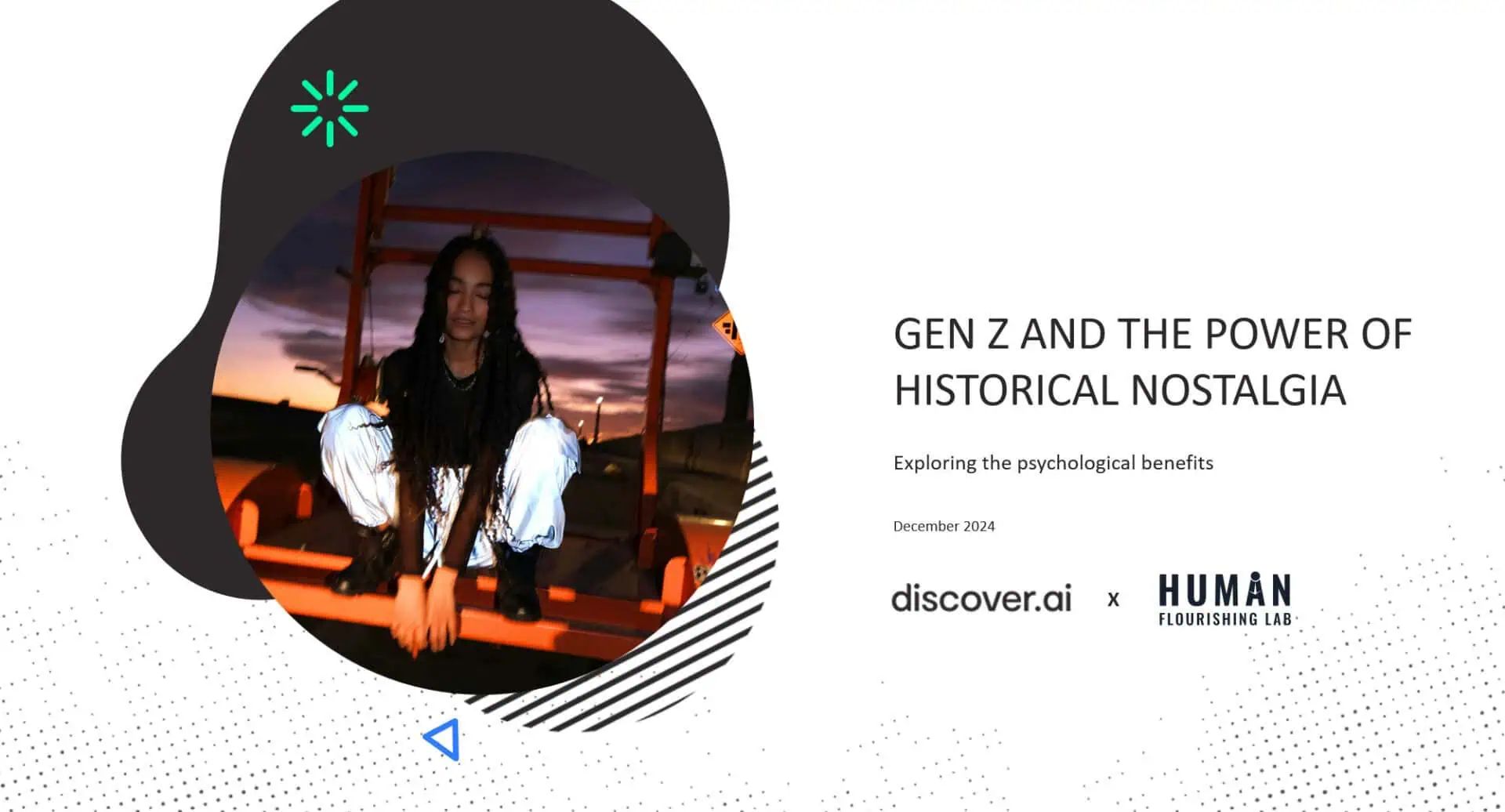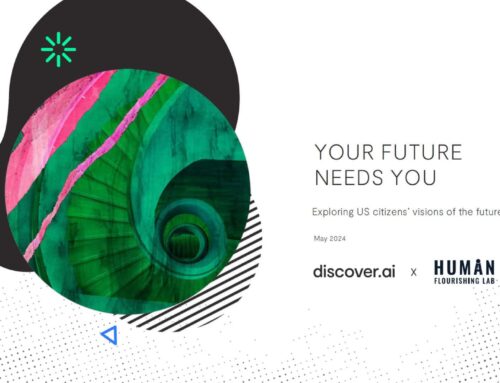
Foreword
By Clay Routledge
One of humanity’s most remarkable capabilities is our ability to mentally time travel. While this cognitive gift enables us to envision and plan for the future—a key to our success as a species—we also draw profound psychological sustenance from the past. In today’s digitally saturated world, all of us, especially younger generations, face unique challenges as we navigate lives increasingly mediated by technology. Our research at the Human Flourishing Lab reveals that while Americans of all ages embrace new technologies that can improve their lives, they also long for a time before everyone was “plugged in.” This finding is particularly illuminating when it comes to Gen Z, as these digital natives express nostalgia for an era that predates them—revealing how nostalgia isn’t limited to our own memories but can take on a historical form, a sentimental longing for eras we never personally experienced.
Through our partnership with discover.ai, we’ve explored how this historical nostalgia serves as a psychological resource for Gen Z, helping young people craft their identities, find creative inspiration, build connections across generations, develop healthier relationships with technology, and look to elements of the past to help solve contemporary challenges and build a better tomorrow. By engaging with the cultural products, trends, hobbies, traditions, and stories of the past, Gen Z is finding novel ways to ground themselves and shape their futures in our rapidly evolving world.
THE GEN Z PERSPECTIVE
Nostalgia is not a new phenomenon—its roots can be traced back to 1688 when the term was first coined to describe the homesickness experienced by soldiers—but culturally it has reached mega-trend status in recent years, as the volatility of the world around us has us reaching into the past to bring about psychological equanimity, inspiration, and joy.
Historical nostalgia is a fascinating branch of this phenomenon. Gen Z is primed for this; the digital saturation of their daily lives and the unprecedented exposure they have to the past online has given them instant access to a world of new and different ideas, values, and expression.
The eras that reigned before their time—from the glamor of the 1980s to the grunge of the 1990s—are now touchstones for Gen Z”s self-expression. By immersing themselves in the aesthetics, rituals, and traditions of these periods, they feel connected to something larger than themselves, grounding them in a world where stability can seem elusive.
Through an exploration of online conversation and narratives, we have sought to explore how this very specific form of nostalgia offers psychological benefits for Gen Z; how it offers a reassuring foundation from which to move forward, to explore who they are, what they value, and what can bring them peace.
ABOUT DISCOVER.AI
discover.ai captures the mood and tone of current conversations online to bring us deep cultural insight.
Our question: What can we learn from online discourse around Gen Z and the phenomenon of historical nostalgia (that is, nostalgia for a time that predates them) that reveals how this form of nostalgia may be serving Gen Z psychologically?
We brought together rich and inspiring language from 114 sources across 12 sourcing areas covering the USA.
- Cultural journalism and discussions of Gen Z and nostalgia, capturing references to different eras and trends (Y2K / ‘90s / ‘80s / ‘70s and before)
- Cultural journalism and industry press that speaks to the resurgence of more analog technologies and behaviors around music formats (e.g., vinyl, cassettes, CDs), gaming (e.g., classic games and consoles), hobbies, crafts, etc.
- Cultural journalism and industry press that speaks to nostalgia in the context of food and beverages, fashion, home décor and design, music, tv, and film
- Content discussing / showcasing / advertising nostalgic brand activations/collabs
- Content that features events and venues tapping into nostalgic experiences
- Gen Z-focused entertainment and pop culture blogs, influencer sites, websites, and online publications covering events, art, music, gaming, celebrities, lifestyle, entertainment, culture
- Future-facing consumer discourse that taps into Gen Z and Pop Culture and Entertainment, including music/festivals, movies/TV, and collectibles
- Future-facing consumer discourse that taps into Gen Z and Creativity and Self-Expression, including content creation, personal brand, crafting, and fashion
- Future-facing consumer discourse that taps into Gen Z and Mental Health and Wellbeing
- Future-facing consumer discourse that taps into Gen Z and feelings/perceptions/behaviors linked to societal or cultural themes or concerns
- Future-facing consumer discourse that taps into Gen Z and Tech, including social media usage, “dumb-phones,” and gaming
- Social media search based on keywords linked to Gen Z and nostalgia/historical nostalgia and informed by trending terms and hashtags on TikTok, etc. (e.g., nostalgiacore)
KEY INSIGHTS
Our findings can be grouped under two overarching themes: “crafting the self” and “roots and wings.”
- Crafting the Self: Exploring and defining identity in a changing world
- Roots and Wings: Nurturing the self through connection, growth, wellness, and playfulness





